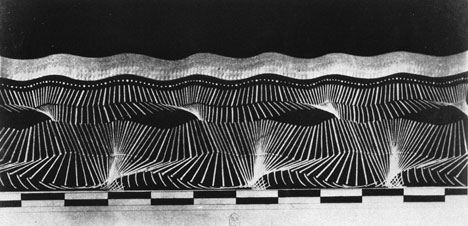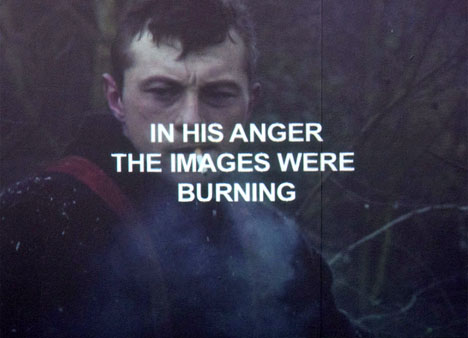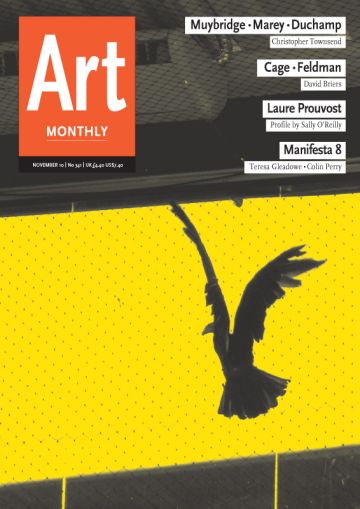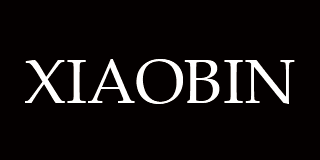Art Monthly 341
November 2010
Muybridge • Marey • Duchamp
Christopher Townsend
Cage • Feldman
David Briers
Laure Prouvost
Profile by Sally O’Reilly
Manifesta 8
Teresa Gleadowe • Colin Perry
Buy Now – select:
Want to read this right now?
Get instant access to the entire back catalogue via Exact Editions from only £8.99!
Contents

EJ Marey Geometric Chronophotograph of the Man in the Black Suit 1883
Feature
Time & Motion
The evolution of filmmaking into cinema was not inevitable argues Christopher Townsend
Eadweard Muybridge, whose work is currently on show at Tate Britain, is often presented as the grandfather of modern cinema. But the concept of time itself was undergoing radical change when Muybridge, EJ Marey and, later, Marcel Duchamp were examining representations of motion. Isn't it time to remember the radical aspects of filmmaking as opposed to the commercial conventions of the cinematic?
'The Puteaux-Cubists, Vorticists and Futurists, in their representation of movement, pursued a project grounded on a wholly different notion of time and space to that which underpinned stop-motion photography and the cinema.'

John Cage 'Every Day is a Good Day' installed at Baltic 2010
Feature
Sounds of Silence
David Briers on John Cage and Morton Feldman
Recent exhibitions dedicated to composers have highlighted a specifically visual art-based understanding of late-modernist music. So what happens when composers' ideas - such as John Cage's maxim, 'chance operations applied rigorously' - are allowed to reign over exhibition making?
'Noting that touring exhibitions are often modified from venue to venue more than people think, curator Jeremy Millar proceeds from the premise of considering the totality of works available to show to be a "repertoire" from which each venue could draw as appropriate. He considers the result to be "an a-curated exhibition".'
Comment
Editorial
Condemned
In the lead up to the government's Comprehensive Spending Review, the public sector was softened up with Lord Browne's proposals for the future of higher education funding. This painted a bleak picture for the next generation of art students: all funding for arts and humanities courses could cease, effectively privatising education. Is the deficit reduction plan really a wheeze to transfer government debt onto individuals?
'Universities are now "free" to compete with each other for students, a policy that will see some universities go to the wall, while students are now "free" to choose to encumber themselves with massive debt for the foreseeable future.'
Artnotes
An initial idea of the scale of the cuts sees the arts hit harder than most other sectors; students mobilise against the privatisation of higher education; quangos are going, going, gone; all the fun of the Frieze Art Fair; the art world is told to get green; galleries open, close and move; and all the latest news on art world appointments, prizes and more.
Submissions: Send Artnotes info to artnotes@artmonthly.co.uk

Laure Prouvost It, Hit, Heat 2010
Profile
Laure Prouvost
Sally O'Reilly profiles the London-based artist
Laure Prouvost works with a range of media, including painting and installation, but she is perhaps best known for her video work and her particularly fevered use of the cinematic. Sally O'Reilly tries to keep up.
'Often infantilising, always self-scuppering and in turns amusing and exasperating, Prouvost pushes the limits of what we will swallow as an audience. She often addresses us directly, in the mode of an omnipotent narrator, and we are trusted to be unconditionally credulous. The artist's heavily accented voice - often poised delicately on the ledge between mispronunciation, malapropism and acceptable meaning - seems personable, even personal, although we are nonetheless aware that we are the every-viewer, being led and misled according to her whim.'
Reviews
Exhibitions
Artists & Cinema
Cornerhouse, Manchester
Chris Clarke
Julian Rosefeldt: American Night
BFI Gallery, London
Omar Kholeif
29th São Paulo Bienal
various venues, São Paulo, Brazil
Teresa Gleadowe
Manifesta 8
various venues, Murcia, Spain
Teresa Gleadowe
Manifesta 8
various venues, Murcia, Spain
Colin Perry
Liverpool Biennial: Touched
various venues, Liverpool
Klara Kemp-Welch
Hydrarchy: Power and Resistance at Sea
Gasworks, London
Jennifer Thatcher
Rafael Lozano-Hemmer
Manchester City Art Gallery
Martin Herbert
Nick Crowe and Ian Rawlinson
Ceri Hand Gallery, Liverpool
Marcus Verhagen
Jason Rhoades: 1:12 Perfect World
Hauser & Wirth, London
Morgan Quaintance
Siobhán Hapaska: Downfall
Ormeau Baths Gallery, Belfast
Gail Prentice
Keith Farquhar: More Nudes in Colour
Studio Voltaire, London
Mark Prince
Paola Pivi: Sorry I Can't Tell You
Carlson Gallery, London
Eliza Williams
Thomas Scheibitz:
A moving plan B - Chapter One
Drawing Room, London
A moving plan B - Chapter Two
Sprüth Magers, London
Alex Coles
Reviews
Books
The Murmuring of the Artistic Multitude
Dave Beech on Pascal Gielen's collection of essays
'Pascal Gielen is an informed, well-read academic who is as competent at diagnosing developments in contemporary curatorial and artistic practice as he is at navigating classic sociological methodology or drawing from the latest political philosophy from Antonio Negri and Michael Hardt or Paolo Virno. To bring all this knowledge to bear on questions about global art, the multitude and current conditions of production, is, for those of us trying to formulate a political understanding of art for the 21st century, a timely and welcome contribution. Unfortunately, Gielen does not bring his broad and detailed knowledge to bear on these questions, but displays his grasp of various ideas separately in essays that were not written to pursue any focused set of questions and which do not hang together.'
Hiroshima After Iraq: Three Studies in Art and War
Francis Frascina on Rosalyn Deutsche's study of recent artworks that re-address Hiroshima
'Rosalyn Deutsche aims to counter politically impatient, "left melancholic" criticism of artists' responses to recent "pressing events" of war, rendition and torture. For her, critics disappointed with anti-war activity suffer from an attachment to past political analysis or ideals that prevents radical critiques of the present. They fail to "explore art's ability to combine a concern for subjectivity [feminist challenges to notions of social totalities and class-based politics] with a concern about the problem of war". '
Sound
Be Glad For The Song Has No End
David Ryan on Wysing's artists' music festival
'Echoing the stereotypical rock festival and organised like a mini Glastonbury, the Wysing event featured three simultaneous venues: the Boulder Stage, a Fred Flintstone-like Hollywood Bowl constructed by Andy Holden; the Amphis Stage, a constructed shack for more intimate performances; and a Cinema Space with a gallery stage.'
Artlaw
Contracts
Public Art Liabilities
Henry Lydiate on the legal exposure when art goes public
'Ai Weiwei's Sunflower Seeds will not be the last public artwork to cause public health and safety concerns: they go with the territory. Which is why all public art commissioners and artists must do their very best to prepare and protect the public against potential hazards; and equip themselves to meet their very strict legal liabilities for public safety.'
Listings
Exhibitions
Exhibition listings
Art Monthly's exhibition listings can also be viewed online.
Submissions: Send Listings info to listings@artmonthly.co.uk









